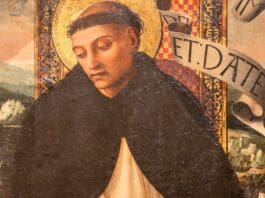
Vincent Ferrer, born on January 23, 1357, in Valencia, Spain, emerged as a cornerstone in the Church’s edifice, renowned for his dynamic contribution to its reinforcement. His entry into the Dominican Order in 1374 marked the beginning of a life dedicated to spiritual austerity and ecclesiastical leadership, quickly ascending to the role of prior in Valencia post-ordination.
Ferrer’s early years were marked by a dual commitment to academia and evangelism. After taking vows, he ventured into philosophy, teaching in Barcelona before earning his doctorate in Lerida, Catalonia’s esteemed university town. This period in Valencia honed his spiritual discipline, setting the stage for a broader mission field that would define his legacy.
The Western Schism, splitting the Christian world between two, later three, Popes, tested Ferrer’s allegiances. Initially siding with Avignon’s Clement VII over Rome’s Urban VI, Ferrer’s convictions mirrored the schism’s divisive spirit. His tenure under Cardinal Pedro de Luna, who ascended as Pope Benedict XIII at Avignon, deepened his involvement in the ecclesiastical maelstrom. Despite efforts, Ferrer’s attempts to mend the schism under Benedict’s papacy fell short, leading to a poignant estrangement from his one-time mentor and friend.
Ferrer’s apostolic zeal flourished post-schism, dedicating two decades to missionary work across Western Europe. His preaching, marked by fervor and urgency, underscored repentance and the imminence of judgment. Dubbed the “Angel of the Judgment,” Ferrer’s ministry catalyzed countless conversions, underpinned by miraculous signs. Witnessing the schism’s resolution and Martin V’s election, Ferrer’s journey concluded on April 5, 1419, leaving a legacy celebrated annually on his feast day, April 5.
Editorial credit: Renata Sedmakova / Shutterstock.com
The post Saint Vincent Ferrer appeared first on uCatholic.
Daily Reading
Memorial of Saints Joachim and Anne, Parents of the Blessed Virgin Mary
Readings for the Memorial of Saints Joachim and Anne, parents of the Blessed Virgin Mary Reading 1 JER 3:14-17 Return, rebellious children, says the LORD, for I am your Master;…
Daily Meditation
How to Be Good Soil
Click here for daily readings Jesus is the divine Sower who sows the seed of his word in the community of followers that he calls apart from the world. The…




